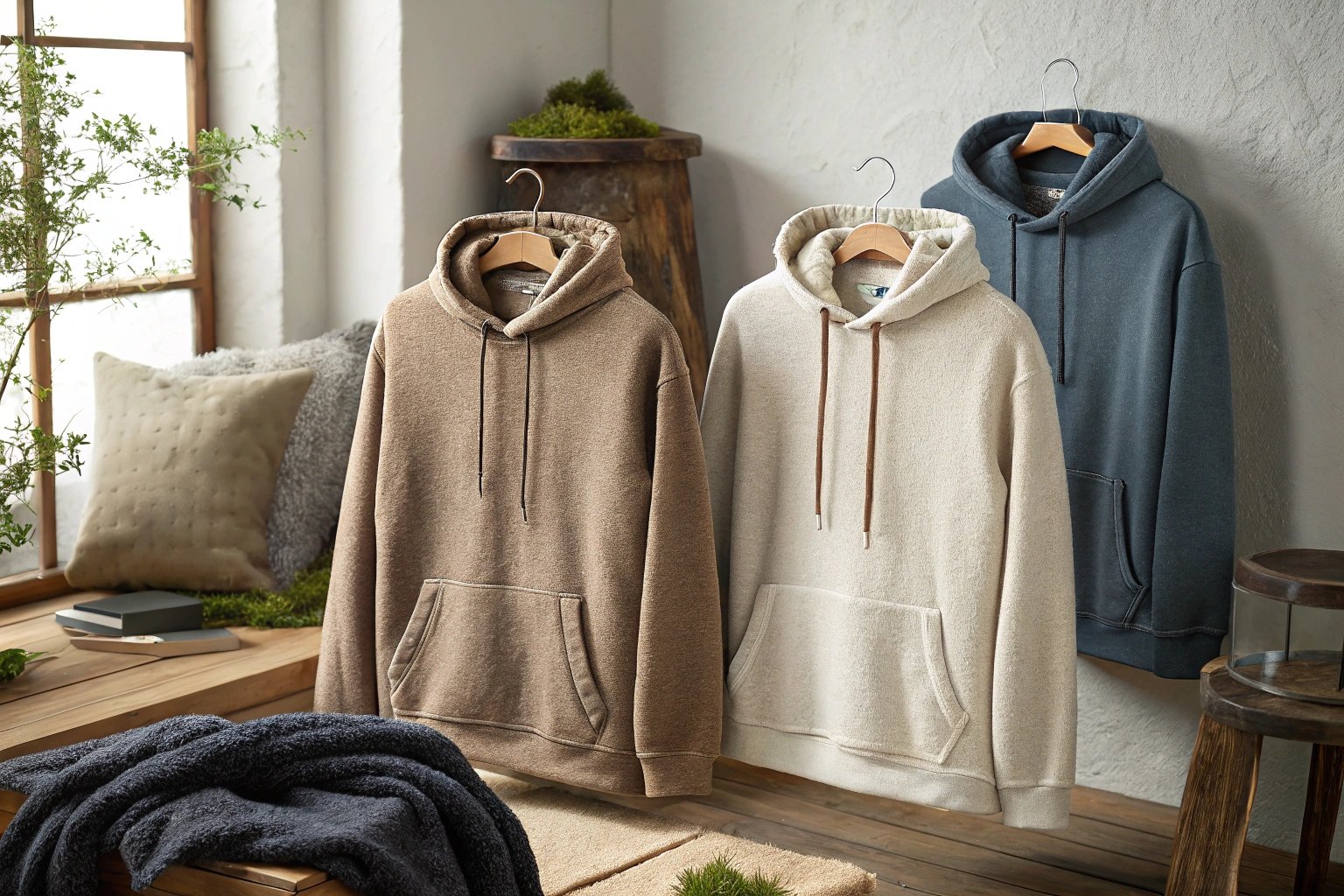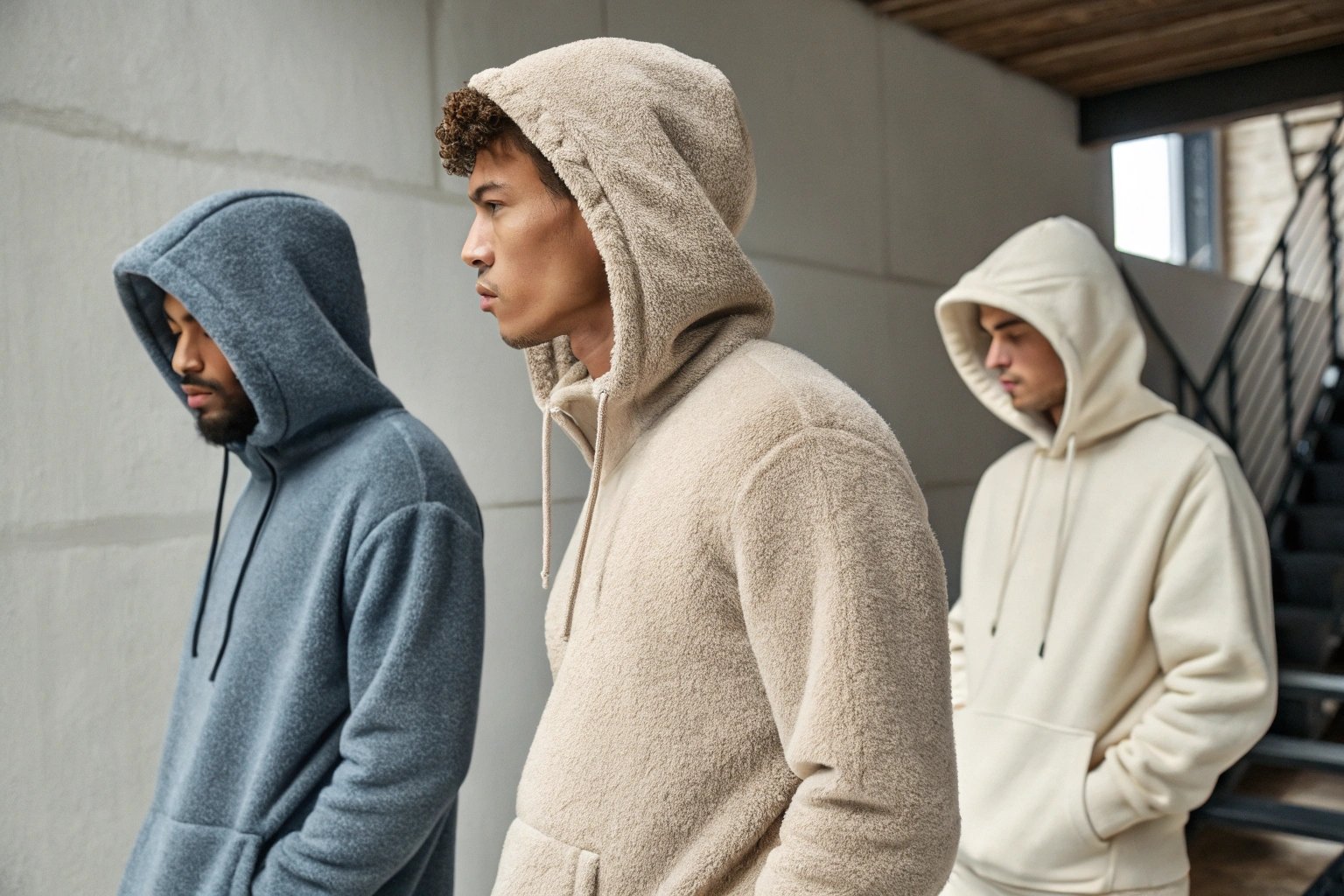When it comes to selecting a hoodie, comfort is key, and softness plays a huge role in that. Whether you’re designing for a fashion-forward brand or crafting a high-performance piece of activewear, the fabric you choose can make all the difference in how the hoodie feels when worn. From the luxurious feel of Airlume cotton to the cozy embrace of Sherpa fleece, the options are endless.

In this guide, we’ll explore the softest materials for hoodies, the factors that make some hoodies softer than others, and what to look for when choosing the right fabric for your hoodie. Whether you’re creating a product for fashion, outdoor adventures, or sustainable living, understanding the variety of fabrics available can help you meet your customer’s needs for comfort, warmth, and durability.
What Are the Softest Hoodies?
When it comes to softness, the material of a hoodie can make or break its comfort level. Below are some of the softest hoodie fabrics that offer a combination of luxury feel, comfort, and warmth:

Airlume Cotton
Airlume cotton is a premium version of combed cotton, which has been treated to remove impurities, resulting in a smoother and softer fabric. The fine fibers make it extremely soft to the touch, and it also provides a sleek, high-end feel. Hoodies made from Airlume cotton offer a luxurious feel against the skin, perfect for casual wear or streetwear brands.
Fleece (Brushed Fleece)
Fleece is one of the softest fabrics for hoodies, known for its fluffy texture and insulating properties. Brushed fleece, in particular, has an extra layer of softness that feels cozy, lightweight, and perfect for colder weather. The brushed fibers give it that extra plush feel, making it a popular choice for high-end hoodie designs.
Sherpa Fleece
Sherpa fleece has a texture similar to that of sheepskin wool, offering both a soft touch and outstanding warmth. Hoodies made from Sherpa fleece are perfect for outdoor activities and cold weather, offering warmth without compromising on softness or mobility. It’s fluffy, warm, and visually appealing, making it a great option for both comfort and style.
Cotton-Polyester Blend
A cotton-polyester blend combines the softness of cotton with the durability and stretchability of polyester. This blend is often used in mid-range hoodies, offering a soft, breathable fabric that provides both comfort and longevity. The polyester component helps the hoodie keep its shape after multiple washes, while cotton offers the soft feel customers expect.
Bamboo Fabric
Bamboo fabric is naturally soft, breathable, and eco-friendly, making it an increasingly popular choice for sustainable fashion brands. Bamboo fabric has natural antibacterial properties, making it ideal for athletic wear or eco-conscious customers who seek comfort with a low environmental impact.
Each of these materials offers a different type of softness and feel, depending on the type of comfort and warmth you’re looking for. Whether it’s the ultra-softness of Airlume cotton or the plushness of Sherpa fleece, the right choice depends on your customers’ preferences and intended use.
What Is the Softest Fabric to Wear?
The softest fabric to wear often comes down to personal preference and what qualities you’re prioritizing, such as comfort, breathability, or warmth. Here are some of the top contenders for the softest fabrics:
Airlume Cotton
As mentioned earlier, Airlume cotton is considered one of the softest cotton types available. It’s perfect for creating garments that feel luxurious yet breathable, making it ideal for everyday wear.
Silk
Silk is often regarded as one of the softest fabrics available due to its smooth, luxurious texture. Although silk is more delicate and may require special care, it’s unbeatable when it comes to comfort and elegance. However, it’s not typically used for hoodies, given its lightweight and fragile nature.
Cashmere
Cashmere, made from the undercoat of goats, is another highly regarded fabric known for its ultra-soft feel and lightweight warmth. While it’s typically more expensive, cashmere hoodies are extremely soft and luxurious, ideal for customers seeking premium comfort.
Modal
Modal is a type of rayon made from beech tree pulp. It’s known for being soft, breathable, and more durable than traditional cotton. Modal is often used in luxury loungewear and casual wear due to its silky feel and moisture-wicking properties.
Among these options, Airlume cotton and modal provide the softest, most affordable options for hoodies, combining comfort and sustainability in a way that appeals to a wide range of customers.
Why Are Some Hoodies Softer Than Others?
The softness of a hoodie is influenced by several factors, including the fabric itself, the construction, and the finishing techniques used. Here’s a look at why some hoodies feel softer than others:
Fabric Type:
As we discussed earlier, certain fabrics, like Airlume cotton, brushed fleece, or bamboo, are inherently softer due to the way they’re made. The finer the fibers and the more luxurious the material, the softer the fabric will feel on the skin.
Brushing or Finishing Process:
Hoodies made from fleece or cotton often undergo a process called brushing to raise the fibers and make the fabric softer and fluffier. This process gives the hoodie that extra cozy feel. Some high-end hoodies use a double-brushed technique for added softness.
Blended Fabrics:
Hoodies made from blended fabrics like cotton-polyester or cotton-modal can feel softer because the mix of materials combines the benefits of each fabric. Polyester, for example, adds stretch and durability, while cotton adds that classic softness.
Weight and Thickness:
Thicker fabrics often feel softer and more luxurious. Heavyweight fleece or Sherpa-lined hoodies provide a plush, soft feel, perfect for colder months when comfort is paramount.
In conclusion, a hoodie’s softness comes down to both material choice and finishing techniques. Understanding these factors will help you design or choose hoodies that offer the perfect balance of luxury and comfort.
What Does a 100% Polyester Hoodie Feel Like?
A 100% polyester hoodie offers several unique qualities that differentiate it from natural fabrics like cotton:
Smooth Texture:
Polyester is known for its smooth and silky texture, making it feel soft to the touch. However, it may lack the breathability and natural softness of cotton or fleece, which may make it less comfortable in warmer weather.
Durability:
Polyester is extremely durable and resistant to shrinkage, fading, and wrinkles. It doesn’t lose its shape after washing and is great for customers seeking low-maintenance fabrics.
Moisture-Wicking:
Polyester is a moisture-wicking fabric, which makes it an excellent choice for activewear or for people who sweat more. It helps keep you dry and comfortable, but some people find it less breathable than cotton.
Lightweight:
A 100% polyester hoodie is often lightweight and more wind-resistant than natural fabrics. However, it may not provide the same level of warmth and softness as a cotton or fleece hoodie.
While polyester may not feel as soft as cotton or fleece, it makes up for this with its durability, moisture-wicking properties, and easy care. It’s a great option for customers who prioritize functionality over softness.
Conclusion
The softest materials for hoodies are often those made from high-quality cotton, fleece, or Sherpa fleece. Choosing the right fabric depends on your brand’s needs, the comfort level you’re aiming for, and the intended use of the hoodie. From the smoothness of Airlume cotton to the cozy feel of Sherpa fleece, the right choice will ensure that your customers not only feel comfortable but also stylish.
When designing hoodies, consider your customers’ preferences for softness, durability, and performance. By selecting the perfect fabric, you can create hoodies that deliver both comfort and style, making them stand out in the competitive fashion market.

